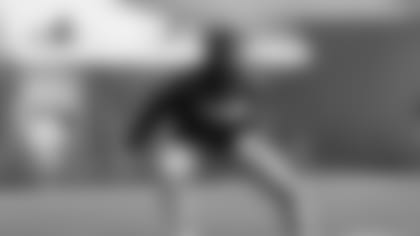After the Texans' loss to the Jacksonville Jaguars on Sunday, referee Walt Coleman explained the ruling on the field that reversed Jaguars tight end Greg Estandia's offensive pass interference penalty on tight end George Wrighster's touchdown catch with 3:51 left in the second quarter.
Q: What happened on the play?
Coleman: On the play where we ruled offensive pass interference and then we came back and decided that it wasn't offensive pass interference. That's the play you're talking about?
Yes.
Coleman: The offensive lineman, No. 83, started at the line of scrimmage and he started his block at the line of scrimmage and drove the defender downfield never breaking contact and you can do that legally and it's not a foul. Man on the line of scrimmage, an offensive player on the line of scrimmage, if he makes his block initially at the line of scrimmage can drive a player down the field as long as he keeps contact and then stops. It's not a foul. We determined after getting together talking that's exactly what had happened, 83 started at the line of scrimmage, that's where he started his block, drove the defender down the and field, stopped, the pass was thrown. No foul touchdown.
Q. How was it changed?
Coleman: The deep official called it. Sometimes it's hard to tell exactly where things start and so forth. That's why we got together and we talked about it to make sure the block started at the line of scrimmage, he didn't lose contact and drove him downfield. It's all about getting together and making sure we get the play right.
{QUOTE}Q. Was that a consensus?
Coleman: The official who called the foul has to make the decision to pick up his flag. Based on the input that we got from all the other officials then he determined he needed to pick up his flag and there wasn't a foul.
Q. Which one picked it up?
Coleman: The back judge threw the flag and picked his flag up.
Q. Did everybody else agree?
Coleman: We all agreed with the rule. We all understood what the rule was and it was just a matter of making sure that's what happened on the play.
Q. The other officials all agreed?
Coleman: None of us were particularly watching that particular guy. We all agreed that if the block started at the line of scrimmage and drove the guy down the field that that was not a foul.
Q. Who saw it that it was legal?
Coleman: The back judge once we talked about the play and he decided it was legal. He's the only one who can decide to pick up his flag.
Q. So it wasn't that another official had a better view of it?
Coleman:No. No. No. No. No. It was strictly his responsibility and he picked it up based on when we got the facts and started talking about it.
Q. The Texans thought it was a holding or pick. It wasn't either one?
Coleman: No. It was not either one.
Q. What would be offensive pass interference?
Coleman: Let's say the defensive guy wasn't on the line of scrimmage. Say he was a yard off the line of scrimmage and then the guy went down and blocked him and then pushed him. That would be a foul. Right at the line of scrimmage, that block is legal. If he'd gone down the field and got the guy or if'd blocked him a little ways and separated and blocked him again that would have been a foul. The fact he had continual contact the whole time that's why it's not a foul.














